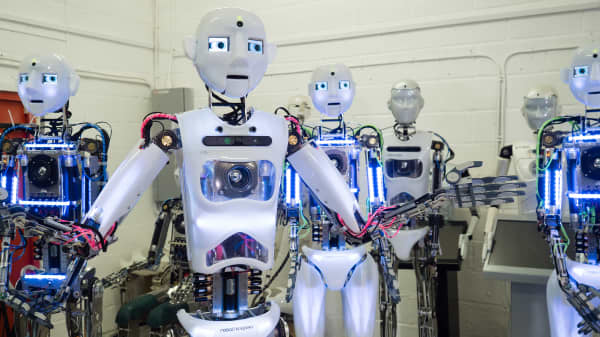- The Fourth Industrial Revolution will take center stage at the World Economic Forum's (WEF) annual meeting next week in Davos, Switzerland.
- It's a term used by CEOs, policymakers and industry to describe technologies like artificial intelligence, quantum computing, 3D printing and the internet of things.
- Some companies and governments are struggling to keep up with the Fourth Industrial Revolution.
Elizabeth Schulze | @eschulze9

What is the Fourth Industrial Revolution? 1 Hour Ago | 04:10
The Fourth Industrial Revolution will take center stage at the World Economic Forum's (WEF) annual meeting next week in Davos, Switzerland.The concept, a theme of Davos this year, refers to how a combination of technologies are changing the way we live, work and interact.
Klaus Schwab, founder and executive chairman of the Geneva-based WEF, published a book in 2016 titled "The Fourth Industrial Revolution" and coined the term at the Davos meeting that year.
Schwab argued a technological revolution is underway "that is blurring the lines between the physical, digital and biological spheres."Simply put, the Fourth Industrial Revolution refers to how technologies like artificial intelligence, autonomous vehicles and the internet of things are merging with humans' physical lives.
Think of voice-activated assistants, facial ID recognition or digital health-care sensors.
Schwab argued these technological changes are drastically altering how individuals, companies and governments operate, ultimately leading to a societal transformation similar to previous industrial revolutions.
The first three industrial revolutions
Zvika Krieger, the head of technology policy and partnerships at WEF, told CNBC on Tuesday there is a common theme among each of the industrial revolutions: the invention of a specific technology that changed society fundamentally.
The First Industrial Revolution started in Britain around 1760. It was powered by a major invention: the steam engine. The steam engine enabled new manufacturing processes, leading to the creation of factories.
The Second Industrial Revolution came roughly one century later and was characterized by mass production in new industries like steel, oil and electricity.
The light bulb, telephone and internal combustion engine were some of the key inventions of this era.The inventions of the semiconductor, personal computer and the internet marked the Third Industrial Revolution starting in the 1960s. This is also referred to as the "Digital Revolution.
"Krieger said the Fourth Industrial Revolution is different from the third for two reasons: the gap between the digital, physical and biological worlds is shrinking, and technology is changing faster than ever.
Telephone vs. 'Pokemon Go'
For evidence of how quickly technological change is spreading, Krieger pointed to the adoption of the telephone. It took 75 years for 100 million people to get access to the telephone; the gaming app "Pokemon Go" hooked that many users in less than one month in 2016.

Toru Hanai | Reuters
Pokemon Go app on an iPhone, Tokyo, Japan, July 22, 2016.Companies in industries from retail to transportation to banking are vying to incorporate new technologies like augmented reality, 3D printing and artificial intelligence into their operations.
A 2017 study by the European Patent Office found the number of patents filed related to the Fourth Industrial Revolution increased a growth rate of 54 percent in the past three years.
"Technology, and specifically digital technology, is so intertwined with many businesses, as well as our social and economic lives, that trying to separate 'tech' from 'non-tech' is becoming increasingly redundant," said David Stubbs, head of client investment strategy for EMEA at J.P. Morgan Private Bank, in an email to CNBC.
Left behind
Companies, governments and individuals are struggling to keep up with the fast pace of technological change.
Krieger, who served as the U.S. State Department's first-ever representative to Silicon Valley from 2016 to 2017, said technology is often missing from policymakers' "toolkits.
" As a result, he said, companies are left filling a void trying to understand how to implement — and regulate — advancements like A.I."There's an absolute hunger for concrete things companies can do," Krieger said.

Will robots take our jobs? 10:40 AM ET Tue, 30 Oct 2018 | 03:10
Jordan Morrow is the head of data literacy at analytics firm Qlik. He said individuals and companies lack skills, like interpreting and analyzing data, to successfully compete in the Fourth Industrial Revolution.
"Not everyone needs to be a data scientist but everyone needs to be data literate," he said in a phone interview with CNBC. Studies show technologies like artificial intelligence will eliminate some jobs, while creating demand for new jobs and skills.
Some experts warn of a "winner-take-all economy," where high-skilled workers are rewarded with high pay, and the rest of workers are left behind.A 2018 report by investment firm UBS found billionaires have driven almost 80 percent of the 40 main breakthrough innovations over the past four decades.
In 2016, Schwab predicted inequality would be the greatest societal concern associated with the Fourth Industrial Revolution.
"There has never been a time of greater promise, or one of greater potential peril," he said.
Follow CNBC International on Twitter and Facebook.
-
- 1
Francisco Gimeno - BC Analyst Great article here. 4th IR is coming at a very fast pace, and if not prepared, a kind of darwinian evolution will take place, where the winners will be those involved in the digital world, and losers those who don't understand yet the whole world is going to change. All revolutions have their birth and growing pains, and the debris of disruption will be left behind. We have to choose where to stand.







